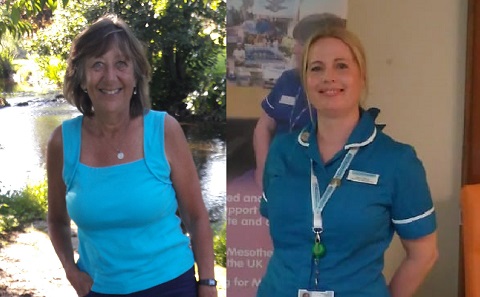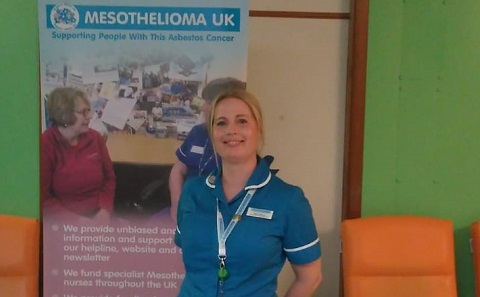Clinical trial for asbestos-linked cancer opens to patients across the south

Southampton researchers are leading a new clinical trial to test whether a targeted cancer treatment could improve survival for people with a rare and aggressive form of cancer linked to breathing in asbestos.
Dr Judith Cave, medical oncologist at University Hospital Southampton (UHS), and the Southampton Clinical Trials Unit are part of the team launching the NERO trial which aims to improve treatment options for patients with mesothelioma.
“Mesothelioma is a challenging cancer,” says Dr Cave. “Unfortunately, there are currently very few treatment options for patients when their cancer stops responding to chemotherapy, and we therefore urgently need to explore more effective approaches to treating this disease.”
Mesothelioma develops in the lining of the lungs or abdomen and currently only five per cent of people survive five years after diagnosis.
Researchers from UHS were recently involved in the University of Leicester-led MiST1 study, a small trial which showed that a class of targeted cancer drugs called PARP inhibitors did have an effect against mesothelioma.
PARP inhibitors have already been shown to improve the survival of patients with breast and ovarian cancers that carry specific mutations. They work by blocking a protein which helps repair damaged DNA in cancer cells, thereby causing the cancer cells to die.
Building on the results of MiST1, Dr Cave is now part of the leadership team working with chief investigators Professor Dean Fennell at the University of Leicester, and Professor Gareth Griffiths and his team at the Southampton Clinical Trials Unit, to run the NERO trial.
Mesothelioma patients whose tumours have continued to grow following chemotherapy and are therefore more likely to be susceptible to a PARP inhibitor, will be invited to join the trial where they will be given a drug called niraparib.
“The MiST1 trial gave us positive data showing that mesothelioma does respond to this type of drug,” says Judith. “But further investigation is needed. We hope that the NERO trial can provide clear evidence that PARP inhibitors could be a new treatment option for patients and potentially give them more time with their loved ones.”
New research welcomed by patients

Helen Wilangowski, 70, was given a prognosis of just 18 months when she diagnosed with mesothelioma in April 2016 after experiencing changes in her breathing.
“It was a huge shock to find out I had this disease and it hit me badly,” says Helen. “I didn’t even tell my children for the first few months as my daughter was doing her finals at university and I just didn’t want to worry them.”
Helen was treated with surgery and chemotherapy which kept her disease stable for several years, but then doctors discovered that the cancer had spread to her lymph nodes.
“I was offered the chance to take part in a clinical trial, which I jumped at,” says Helen. “Thankfully, the drugs have been successful in keeping my cancer stable, but for how long no one knows. It means a great deal to know that more trials, like the NERO trial, are now being carried out to help find better treatments for the future.”
The NERO trial has been developed in collaboration with Mesothelioma UK, a national charity working to support mesothelioma patients and research into the disease.

Helen Wilkes is the Mesothelioma UK Cancer Nurse Specialist at University Hospital Southampton and says: “As Mesothelioma UK nurses we work alongside research nurses at participating hospitals to let patients know when trials are happening and how they may be able to get involved. We will support trial participants if they have concerns or need advice between clinical appointments or if they just want to talk to a friendly, understanding voice.”
“I’m very excited about the NERO trial opening as it’s another step forward on the road to better treatments for these patients, and hopefully an eventual cure. The day my job no longer exists will be the best day because it means we have got there.”
Building on previous breakthroughs
Judith and the team behind NERO also recently published the results of the CONFIRM trial, the first study of its kind to show that an immunotherapy treatment improved survival for patients with mesothelioma.
Professor Gareth Griffiths, Director of the CRUK Southampton Clinical Trials Unit, says: “This was a huge breakthrough for mesothelioma research, and immunotherapy has now been included in European treatment guidelines for this disease, which is great news for our patients. However, if patients fail on standard of care treatment mesothelioma remains an incurable disease. Therefore, further research into other treatment options, in addition to just active symptom control, is desperately needed and the NERO trial is another step towards this.”
NERO will recruit 84 patients who have already had chemotherapy treatment at hospitals across the UK. Patients will be randomly allocated into one of two arms within the trial, with a 2:1 chance of receiving niraparib so that the researchers can compare the effect of the drug on the tumour. Those patients who do not receive niraparib will be closely monitored for signs of early tumour growth so that they can go on to receive an alternative treatment if necessary.
The trial opened in Leicester earlier this year and has now also opened to patients at University Hospital Southampton where it will recruit patients from across the South, including those treated at the Queen Alexandra Hospital in Portsmouth. Other hospitals now running the trial include The Princess Alexandra Hospital in Harlow and Musgrove Park Hospital in Taunton. Patients who wish to participate should speak to their doctor or oncology team.
NERO is funded by Asthma and Lung UK and developed in collaboration with Mesothelioma UK, with additional support from Cancer Research UK core funding at the Southampton Clinical Trials Unit.
'Championing mesothelioma research' blog - Read our blog article with mesothelioma patient Helen Wilangowski and Mesothelioma UK nurse Helen Wilkes about why they are passionate about new research into the disease.
Notes for editors
The NERO trial – To find more details about the trial, please visit the trial webpage.
Figures from Cancer Research UK mesothelioma webpage.
The Southampton Clinical Trials Unit (SCTU) is a Cancer Research UK funded CTU with expertise in the design, conduct and analysis of interventional, multi-centre clinical trials. The CTU is based within the University of Southampton with offices at the University Hospital Southampton NHS Foundation Trust Southampton General Hospital site. For more information, visit the SCTU website, or follow us on Twitter or Facebook.
University Hospital Southampton NHS Foundation Trust is one of the largest acute teaching trusts in England with a turnover of more than £1 billion in 2020/21. UHS provides hospital services for 1.9 million people living in southern Hampshire and specialist services – including neurosciences, respiratory medicine, cancer, cardiovascular, obstetrics and specialist children’s services – to more than 3.7 million people in central southern England and the Channel Islands. UHS is consistently one of the UK's highest recruiting trusts of patients to clinical trials and in the top ten nationally for research study volume as ranked by the NIHR Clinical Research Network. In partnership with the University of Southampton, UHS has £27 million of NIHR infrastructure dedicated to bringing the latest treatments to patients. Visit the UHSFT website.
The CONFIRM trial - Nivolumab versus placebo in patients with relapsed malignant mesothelioma (CONFIRM): a multicentre, double-blind, randomised, phase 3 trial. Read the full publication in The Lancet Oncology.
The MiST1 trial - Rucaparib in patients with BAP1-deficient or BRCA1-deficient mesothelioma (MiST1): an open-label, single-arm, phase 2a clinical trial. Read the full publication in The Lancet Respiratory Medicine.